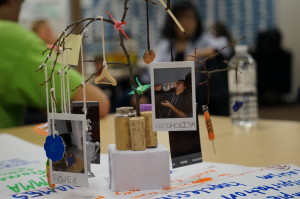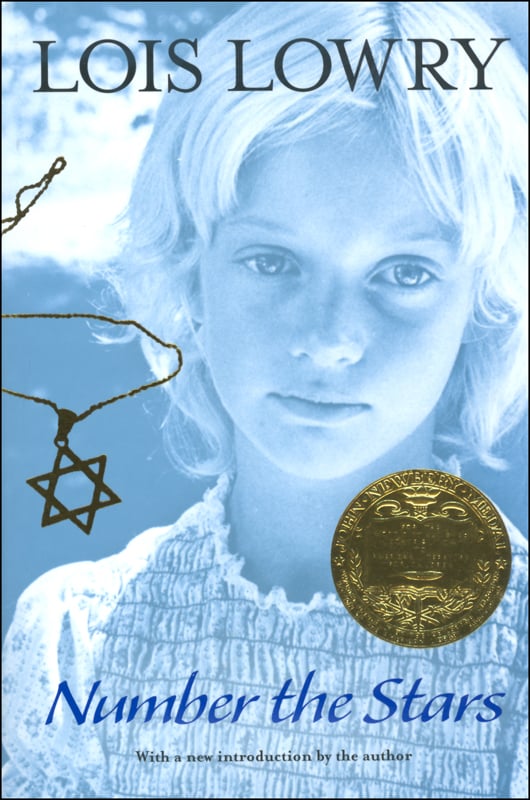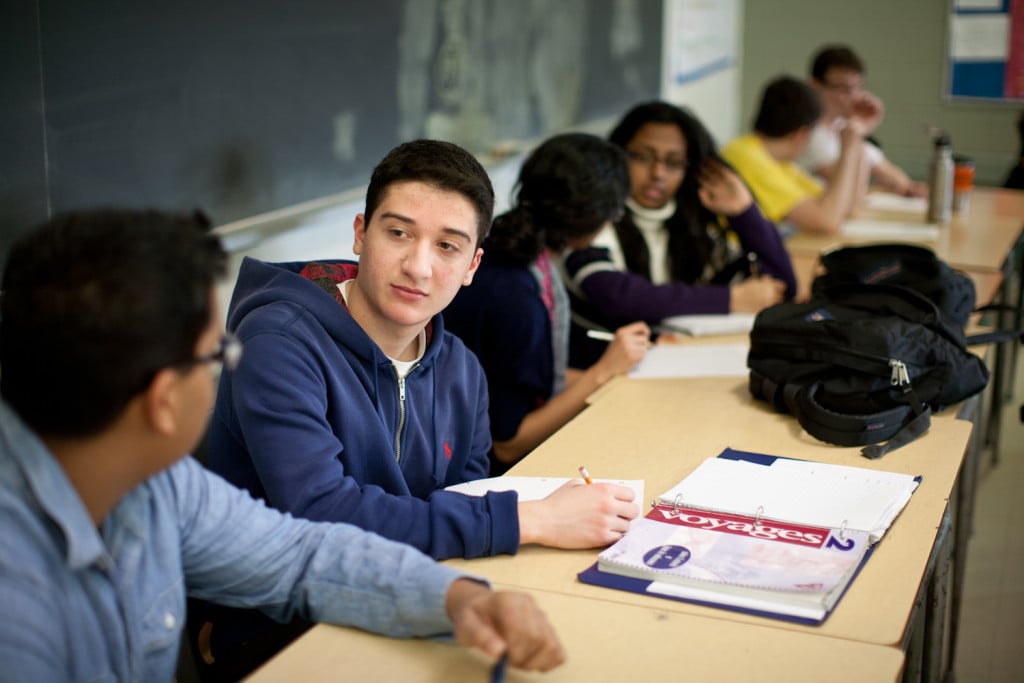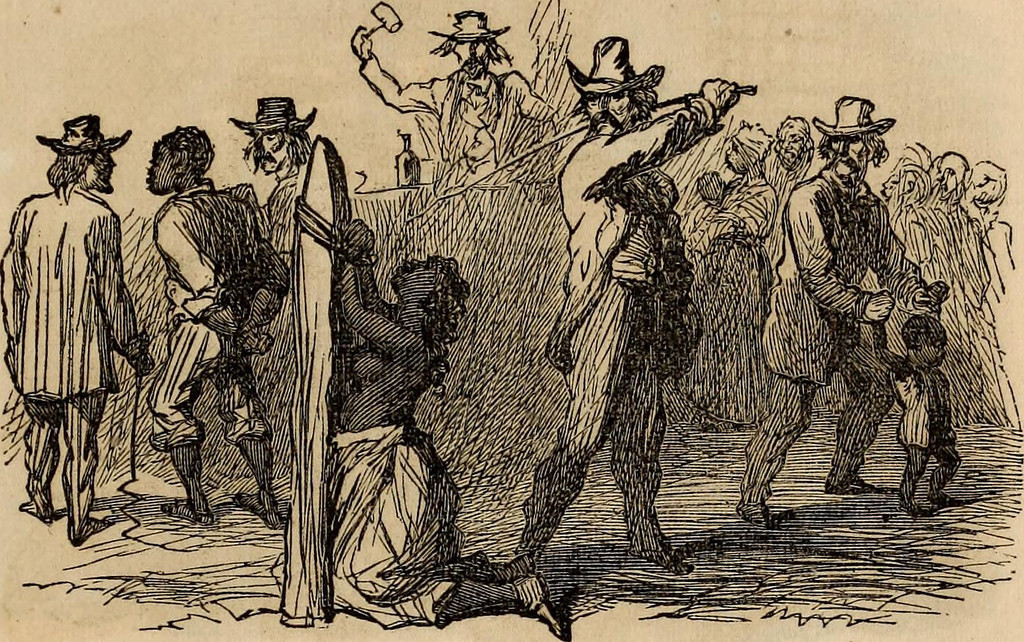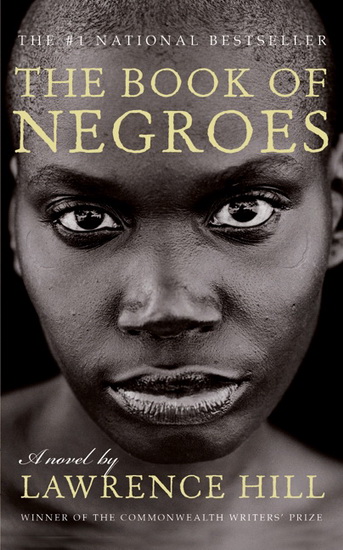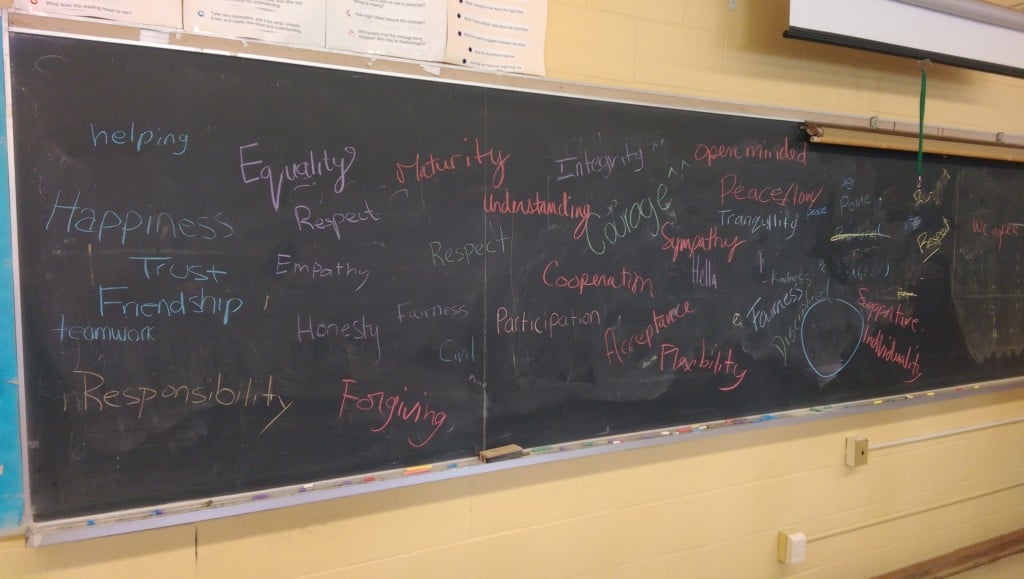Ever since attending my first Facing History and Ourselves workshop, I have looked for ways to incorporate Facing History pedagogy into my middle-years classroom. This year, I used the scope and sequence and pedagogical triangle to design the structure of my Grade 8 English Language Arts course.
Topics: Strategies, Book, English, stolen lives, Reading List, Decolonizing Schools, Facing Canada, cross curricular teaching and learning
Youth and Teachers Respond Collectively to Art Spiegelman's Maus Through Art and Inquiry: An Interview with Professor Rob Simon and Delta Senior Alternative School Teacher Sarah Evis
Posted by Rob Simon on December 21, 2015
In 2015, Dr. Rob Simon, Associate Professor at the Ontario Institute for Studies in Education of the University of Toronto (OISE), and students from his teacher education course partnered with Sarah Evis, a teacher from Delta Senior Alternative School in the Toronto District School Board (TDSB), and her grade 8 students, to study Art Spiegelman’s popular intergenerational Holocaust survivor memoir and graphic novel, Maus: A Survivor’s Tale.
Topics: Art, Books, Antisemitism, Choosing to Participate, Holocaust, Facing History and Ourselves, Innovative Classrooms, Holocaust Education, Middle School, Strategies, Culturally Responsive and Relevant Pedagogy, Night, genocide, Lesson Ideas, big paper, Inside a Genocide Classroom, Social Justice, Personal history
The Danger of a Single Story: A Back to School Reflection
Posted by Ariel Vente on September 13, 2015
As the school year gets under way, many of us are thinking about, planning and setting up our classrooms. We are thinking about our new students, and how we are going to plan our school year to meet the needs of all our students.
Topics: Safe Schools, Urban Education, Strategies, Lesson Ideas
Confronting Bullying, Peer Pressure and Exclusion in a Middle School Classroom: Reflections on my First year Part II
Posted by Jonathan Temporal on July 7, 2015
Bullying. Ostracism. Peer pressure. Exclusion. Most teachers have faced these destructive forces at one point or another and struggled with how to address these issues in the classroom. This is how Facing History and Ourselves helped prepare me for confronting these issues in my classroom.
Topics: Safe Schools, Bullying, Middle School, Strategies, Lesson Ideas
Reflections on my First Year as a Facing History Teacher Part 1: “Healthy Tensions”
Posted by Jonathan Temporal on June 30, 2015
Early in my teaching career I came across Voltaire's aphorism, which states, “perfect is the enemy of good.”[1] As my fifth year as a middle school teacher, and my first year as a Facing History teacher comes to a close, I developed a new appreciation for this message.
Ten months ago, shortly after participating in the Facing History and Ourselves: Holocaust and Human Behaviour seminar, I wrote a blog post detailing my plans for my first year as a Facing History and Ourselves teacher. I strongly believe in the power that the Facing History and Ourselves curriculum offers students, and I wanted to make sure I lived up to what it meant to be a Facing History teacher. During the year, I found myself chasing the “perfect” lessons, which I hoped would chain together to create the “perfect” unit, and the “perfect” year. Here is what I have learned since then.
Topics: Identity, Holocaust Education, Middle School, Strategies, Lesson Ideas
From Understanding to Upstander: Inside a Genocide Studies Classroom
Posted by Lanny Cedrone on April 13, 2015
One of the questions that we often struggle with as teachers, and even more so as teachers that cover issues of genocide, is How do we even begin to understand something that is so far removed from most of our personal experiences?
Topics: Choosing to Participate, Safe Schools, Identity, Strategies, Genocide and Crimes Against Humanities Course, Lesson Ideas, Inside a Genocide Classroom
Teaching “The Book of Negroes” Part III: Addressing Difficult Moments in History
Posted by Jasmine Wong on March 6, 2015
For the past few weeks, I have been thinking and writing about ways to bring The Book of Negroes into the classroom through discussions of identity, and a study of the history of race and slavery in America.
The first post offered ideas for establishing a safe classroom for discussing difficult ideas through contracting. It also offered a strategy for exploring names, identity, and the relationship we each have to the world. The second post built on the theme of identity by examining the beliefs we hold that separate us from others, and how our beliefs can influence the choices we make. This week, I want to address how teachers can bring the book’s difficult moments into the classroom safely.
Topics: Facing History Resources, Facing History and Ourselves, History, "The Book of Negroes", Strategies, Lesson Ideas, Slavery, Literature
Teaching “The Book of Negroes” Part I: Race, Names, and Identity
Posted by Jasmine Wong on February 11, 2015
It always amazes me how good literature has the capacity to expand our understanding of our world, challenge our memory of history, and grow our thinking about human nature and human experience.
As someone who works with educators, I love to see how bringing great stories grounded in lived experiences into classrooms can begin conversations, spur questions, and help students make connections between themselves, the lives of others in the stories they read, and the world around them.
Topics: Identity, "The Book of Negroes", Strategies, Lesson Ideas, English Classroom, Literature
Establishing a Safe Classroom in Order to Explore Difficult Topics
Posted by Jason Monteith on January 22, 2015
What does a safe classroom look like to you?
I am sure in thinking about a safe classroom some key terms such as respectful, inclusive, or equitable cross your mind.
What would happen if you asked your class the same question?
Topics: Back-To-School, Safe Schools, Strategies, Lesson Ideas, Inside a Genocide Classroom
8 Lessons the Museum of Human Rights Taught Me about My Classroom
Posted by Jamie on November 27, 2014
Museums are invaluable to education. The carefully selected exhibits, information, and artifacts provide tangible and visual evidence for exploration, reflection, and dialogue that support lessons in the classroom. Museums allow students to build upon prior knowledge – to see things differently.
Topics: Art, Choosing to Participate, Facing History Resources, Holocaust, Canada, Innovative Classrooms, Museum Studies, Strategies

